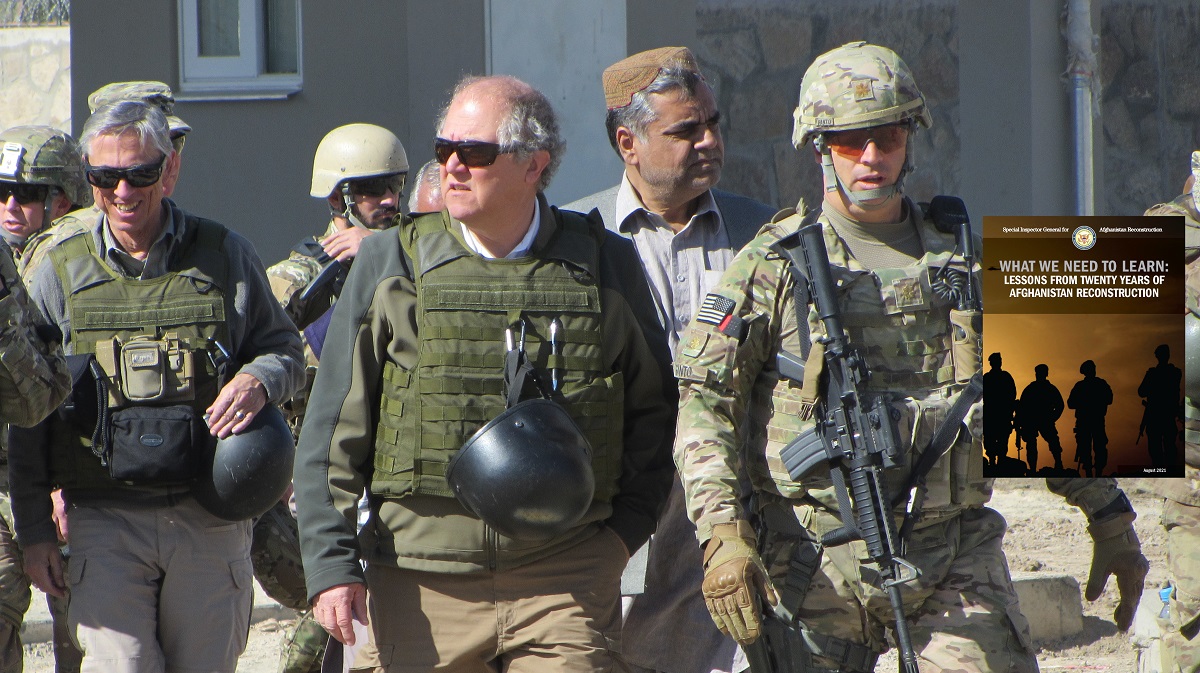
Short-term-itis, also known as short-termism, is not a new concept and can be simply defined as “an excessive focus on short-term results at the expense of long-term interests.”
In July 2022, John F. Sopko, the Special Inspector General for Afghanistan Reconstruction (SIGAR), emphasized a critical problem called “short-term-itis.” According to Sopko, “Everyone in Washington is focused on showing success under unrealistic timelines that do not reflect the reality on the ground…We didn’t fight ‘one’ twenty-year war – we fought ‘twenty’ one-year wars.” His comments present a common issue that permeates organizations: the trap for government personnel to make short-term decisions without taking into account the effects on U.S. long-term interests. This issue mentioned by Sopko raises questions about what factors contribute to these decisions and how organizations can reduce them to better align with their long-term interests. This article examines the problems SIGAR exposes and provides suggestions to minimize short-term decision-making among government agencies, specifically military services.
Short-term-itis, also known as short-termism, is not a new concept and can be simply defined as “an excessive focus on short-term results at the expense of long-term interests.” This overemphasis on quick results is a complex problem influenced by several organizational factors pushing individuals to make such decisions to meet set quotas or financial compensations like bonuses and promotions. For over 30 years, scholars and practitioners across different sectors, from business to government, have debated the consequences of short-termism. For example, those in the financial sector argue that short-termism was a pivotal contributor to the 2008 Global Financial Crisis that led to a world-wide recession. The Federal Deposit Insurance Corp (FDIC) chairman at the time, Sheila C. Bair, noted that the common theme throughout Wall Street and Washington is the overvaluing of short-term gains while discounting the long-term consequences. Bair also expressed that routine decision-making is usually influenced by greed and instant gratification, another reason for short-termism.
This perspective on decision-making driven by self-interest has implications that extend beyond individual decision-makers to encompass institutions such as government and military organizations. Various factors such as election cycles, constituents, and lobbyists exert pressure on government officials to prioritize short-term gains. For example, the United Nations has argued that this short-termism exhibited by governments and investors has impeded progress toward creating sustainable economies in developing countries impacted by climate change.
Political pressures, stemming from changes in government leadership, budget constraints, and lobbying efforts, have also formed barriers to long-term initiatives aimed at promoting sustainability and economic equity. Furthermore, within military organizations, the combination of organizational pressures and performance-based incentives, such as promotions, may encourage short-term gains at the expense of strategic long-term goals.
Although several factors contributing to short-termism can be applied from other sectors to the military, deployment lengths and results-based culture are two important factors for personnel who served in Afghanistan. According to Sopko, short tours of duty for both military and foreign service personnel created critical knowledge gaps during handovers, which he dubbed the “annual lobotomy.” This high turnover combined with the pressures to perform put individuals in a situation to make mistakes similar to those made by their predecessors. One SIGAR report provided an example of the Combined Security Transition Command – Afghanistan’s (CSTC-A) missteps driven partly by the high turnover of personnel:
In one instance in 2013, incoming personnel at CSTC-A requested $195.2 million for specialized military cargo trucks on behalf of the Afghan National Army, unaware that the White House and the National Security Council had already approved an identical request placed by their predecessors. Under pressure to allocate funds quickly and without knowing they were duplicating an already-filled order, CSTC-A personnel went ahead and procured the trucks anyway, even though the Afghan government did not need them.
This particular instance, which is one of several identified by SIGAR, highlights how the difficulties associated with short deployment cycles may be compounded when operating within a military culture that is results-based. In his speech, Sopko noted how military units would arrive, conduct an assessment, highlight their progress mid-way, and claim their successes on their way out, with the next unit repeating the same cycle. Personnel often failed to recognize the previous unit’s contributions and typically adopted a new approach to address the issue without any meaningful impact on the situation on the ground.
Similar to the business sector pressures created by sales quotas to gauge performance, U.S. government personnel felt pressured to show quick results in Afghanistan. For example, unrealistic timelines placed U.S. government personnel under undue stress to deliver results through reconstruction projects. This pressure was seen more on military personnel as they continuously increased spending on these projects.
According to General David Petraeus, “What drove spending was the need to solidify gains as quickly as we could, knowing that we had a tight drawdown timeline. . . . And we wound up spending faster than we would have if we felt we had forces longer than we did.” Furthermore, the excessive focus on spending became the short-term pressure to gauge results at the expense of actual long-term conditions on the ground. In a SIGAR interview, an unnamed United States Agency for International Development (USAID) official said, “There was a real and pervasive belief that if you dumped money into an economy, you could save it. Those of us who said otherwise were ignored…The strategy was “money expended equals success.” Thus, the pressure to demonstrate tangible outcomes during the U.S. military’s drawdown of troops influenced short-term decision-making, undermining the effectiveness of these programs to just measuring money spent.
One recommendation is for leaders to create a conditions-based versus a performance-based evaluation system for commanders at all levels while deployed.
Considering that certain governmental pressures influencing short-termism such as budget cycles, limited time in positions, deployment cycles, and the need for cross-organizational coordination, are unlikely to dissipate, how should U.S. government personnel across the different departments and agencies ensure they do not feel pressured to make short-term decisions, as seen in Afghanistan?
One recommendation is for leaders to create a conditions-based versus a performance-based evaluation system for commanders at all levels while deployed. Similar to the financial sector, the military evaluation system incentivizes short-term results over long-term gains causing personnel to seek a short-term competitive advantage over their peers for promotion. Moreover, any long-term consequences from their decisions may not be seen until after they are promoted and moved on to another position not associated with their previous unit or deployment. Thus, a conditions-based evaluation system may impel commanders to focus on how their tactical tasks, subordinates, and performance unique to their operations on the ground contribute to the long-term strategic goals while deployed. Although an alternate evaluation system for deployments may not entirely prevent short-termism, it may give personnel a sense of security that their careers are not at risk due to the perception of not performing because of constraints or other conditions out of their control on the ground.
At the policy level, U.S. policymakers must ensure that timelines for producing results do not create conditions for short-termism for personnel on the ground. One significant finding by SIGAR was that unrealistic timelines and expectations created organizational pressure and reinforced short-termism among personnel on the ground, contributing to the failure of programs in Afghanistan. To the degree allowed by other external factors such as elections and other stakeholders, U.S. policymakers must ensure decisions and timelines are developed based on the ground conditions and have the flexibility to ensure long-term strategic goals are not at risk due to timelines influenced by budget or deployment cycles.
Interestingly, it remains unclear how the duration of deployment cycles affects short-termism. Although the conventional wisdom as expressed by Sopko in his speech suggests that longer deployments help, others argue that shorter but repeated deployments to the same region may encourage focus on longer-term objectives. Longer deployments might also create other problems, like reduced reenlistment rates. Business literature is similarly ambiguous about how length of tenure might affect short-termism. An article in the Harvard Business Review highlighted the contradictory results of studies conducted on this issue over the years. Some scholars suggest that brief CEO tenures promote short-term thinking, while others have found that CEOs who remain in their positions for extended periods are more inclined to take on short-term risks that may jeopardize long-term benefits.
Unfortunately, the pressure to spend money because of a budget cycle is also another contributor to short-termism, as seen with the CSTC-A personnel under pressure to allocate funds because of a budget cycle that didn’t align with their deployment cycle. This put unneeded stress on personnel and resulted in excess expenditure of almost $200 million. It is imperative that budget cycles become more pliable and adaptable to changing circumstances, which may not align with initial projections. Even domestically, government agencies, including military personnel, experience pressure to overspend towards the end of the fiscal year to guarantee their budget for the upcoming year. According to Liebman and Mahoney, allowing government budgets to roll over reduces end-of-year spending, as seen with the Department of Justice’s special rollover authority for their extensive information technology (IT) projects. Thus, governmental budget policies should offer more flexibility on expenditures to prevent personnel from feeling compelled to overspend due to the fear of losing funding, another crucial factor promoting short-termism.
Considering the operational constraints at the time, it would not be reasonable or justifiable to attribute blame for short-termism in Afghanistan to any particular entity. However, the challenges in Afghanistan mentioned by Sopko and his team suggest the importance of studying short-termism across all U.S. government departments and agencies that contributed to this complex problem. Further inquiry is merited to explore potential modifications to deployment rotations, personnel evaluations, and budget cycles, with the goal of mitigating the effects of short-termism.
The issue of short-termism is not new, and its resolution is not imminent. Nevertheless, officials in government and the military must acknowledge the potential repercussions that may arise when excessive emphasis is placed on short-term objectives at the expense of the overall success of a long-term strategy. As highlighted by Sopko’s concluding remarks, “The only real question is whether, next time, we want to learn from the mistakes that we experienced at such great cost in blood and treasure, or – as we’ve done all too often in the past – make it up as we go and see how things turn out.”
Assad Raza is a retired U.S. Army Civil Affairs officer. He holds a Bachelor of Arts in psychology from the University of Tampa, a Master of Arts in diplomacy with a concentration in international conflict management from Norwich University, and a Master of Military Art and Science from the U.S. Army Command and General Staff College.
The views expressed in this article are those of the author and do not necessarily reflect those of the U.S. Army War College, the U.S. Army, or the Department of Defense.
Photo Description: John Sopko, Special Inspector General For Afghanistan Reconstruction
Photo Credit: SIGAR Office




